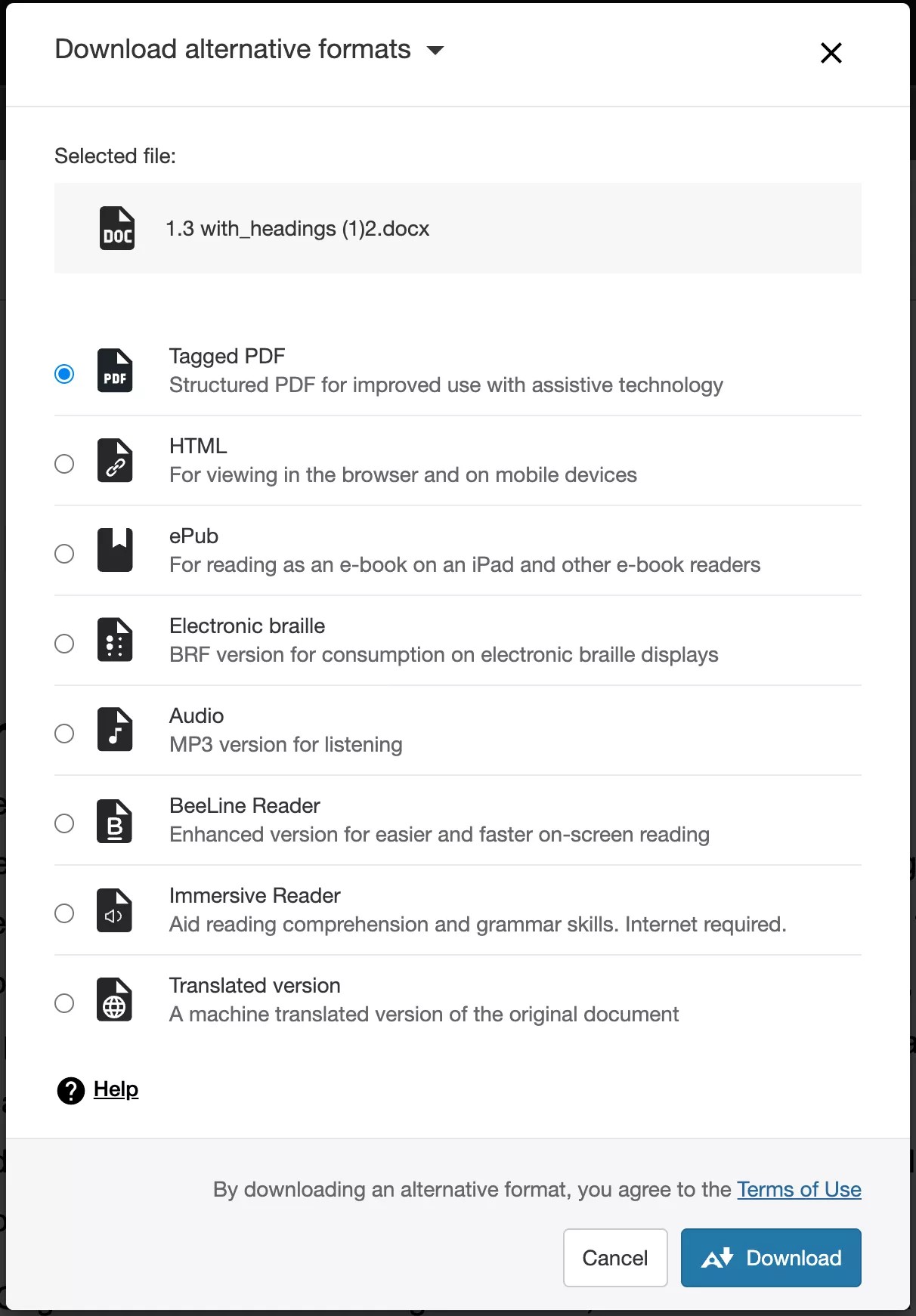Alternative formats benefit everyone
Many schools today, both physical and digital, are integrated with students with diverse needs. Alternative formats provide greater opportunity for everyone to access the information they need in the way they need or want it.
With alternative formats all students can meet the same learning objectives using resources that are built to target the needs of the individual student. For example, Anthology Ally creates audio and electronic braille alternatives for students with visual impairments.
Alternative formats aren't just for a select group of students. Alternative formats benefit everyone. For example, your students may be prone to eye strain, or maybe they are an auditory learner. They can listen to an audio format of the file you uploaded instead. Or use the HTML or ePub formats for easier reading on a mobile device.
More on the different alternative formats and their benefits
Instructors don’t need to do anything. Ally creates the alternative formats for you.
Find Alternative Formats WCM
Find the available alternative formats
After files are attached to a site, Ally creates alternative formats of the file based on the original. For example, if the original file is a PDF, Ally creates audio, electronic braille, and ePub formats of the same content. These formats are made available with the original file so everything is in one convenient location.
The alternative formats created depend on the original file type. If you don't see an option to download alternative formats, Ally isn’t enabled for that website or the file is not a supported content type.
Find a file on the website and select the Alternative formats download icon beside it. Choose the version that is best for your needs!
What alternative formats does Ally generate?
Welche alternativen Formate werden von Ally erstellt?
Ally stellt alternative Formate für diese Inhaltstypen bereit:
- PDF-Dateien
- Microsoft® Word-Dateien
- Microsoft® Powerpoint®-Dateien
- OpenOffice-/LibreOffice-Dateien
- Hochgeladene HTML-Dateien
- Im LMS-Kurseditor erstellte Inhalte (WYSIWYG)
Alternative Formate für WYSIWYG-Inhalte sind derzeit nur für Blackboard Learn Ultra, Blackboard Learn Original, Instructure Canvas, D2L Brightspace und Schoology verfügbar.
Diese alternativen Formate können generiert werden:
- OCR-fähige Version (für gescannte Dokumente)
- PDF mit Tags (derzeit für Word-, PowerPoint- und OpenOffice- oder LibreOffice-Dateien)
- Mobil-freundliches HTML
- Audio
- ePub
- Elektronisches Brailleformat
- BeeLine Reader
- Übersetzte Version
- Übersetzte Versionen sind standardmäßig deaktiviert. Administratoren können eine Supportanfrage einreichen, um dies zu aktivieren.
What does the instructor need to do to generate alternative accessible formats for a content item?
Nothing. Ally automatically picks up on any existing or new materials, runs it through the accessibility checklist, and makes the alternative accessible versions available to both the student and the instructor.
Is there a file size limit?
No, there is no file size limit. There may be cases where the algorithm fails to generate alternative accessible formats for certain large files, but Ally doesn’t enforce a maximum file size.
How does Ally handle password protected content?
Ally detects password-protected content, gives them a 0% accessibility score and provides guidance to help remove the password through the instructor feedback. Ally does not generate any alternative formats for password protected content, as we can’t get access to the actual content.
Can I disable alternative formats?
Not at this time.


 Mitglied der Ally-Benutzergruppe werden
Mitglied der Ally-Benutzergruppe werden